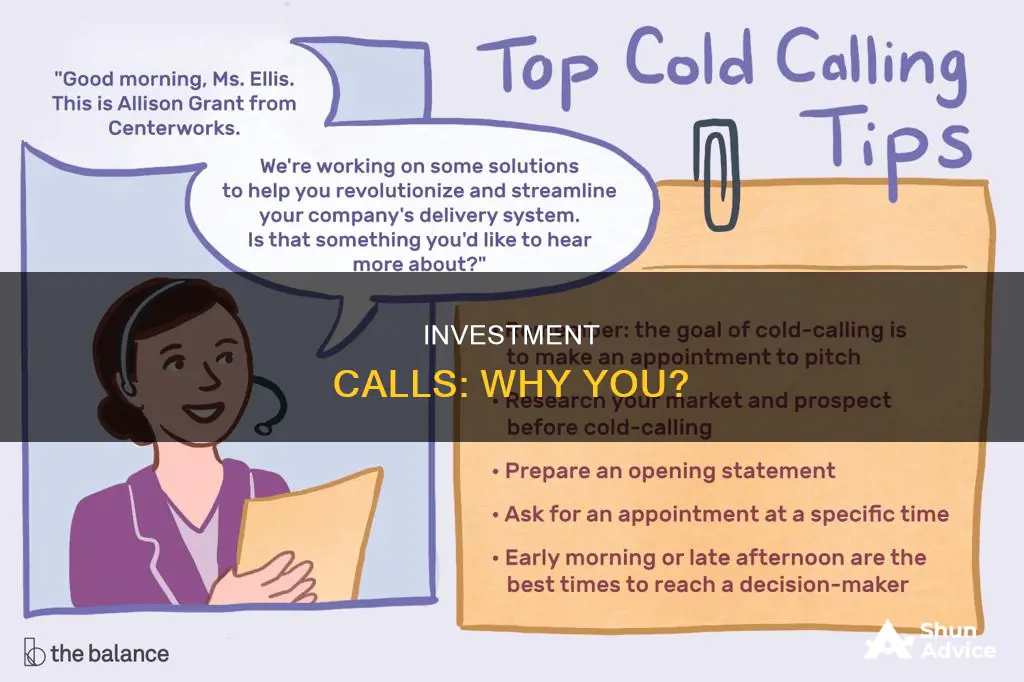
Unsolicited calls from people trying to sell investments are known as cold calls. While some businesses use cold calls as a legitimate way to reach potential customers, scammers also use this tactic to pressure people into buying bad investments or falling for scams. If you receive a cold call about an investment opportunity, it is best to hang up. You can also register your phone number on the National Do Not Call Registry to avoid receiving telemarketing calls. If you do engage with a cold caller, be aware of high-pressure sales tactics, pitches that stress once-in-a-lifetime opportunities, and callers who refuse to send you written information about the investment. Always do your own checks before investing and be cautious of offers that sound too good to be true.
| Characteristics | Values |
|---|---|
| People's reaction to cold calls | People are annoyed, worried about scams, or unsure about the legitimacy of the call |
| Reasons for cold calls | Legitimate companies use cold calls to reach potential customers; scammers use cold calls to defraud people |
| How to deal with cold calls | Ask the company name and then call their official phone number; hang up and call the broker/bank directly; register with the "National Do Not Call Registry" |
| How to spot a scam | You've never heard of the firm; there's a call centre "buzz"; they use your first name as it appears on share registers; they ask how your current investments are doing; they say bank savings earn little; they ask about your job; they mention "Chinese demand"; they ask how much you can "start with"; they lie about their commission; they claim to have invested in the opportunity themselves; they switch between "junior" and "senior" broker; they ask if you understand the investment; they promise to post or email details but don't; they contact you again even if you've said you're not interested |
What You'll Learn

How to spot an investment scam
Investment scams are a special kind of fraud, where individuals pose as investment brokers or financial advisors and try to convince unsuspecting people to hand over their money to them. Here are some ways to spot an investment scam:
Be wary of cold calls and unsolicited approaches
Most scammers will not wait for you to approach them. They will reach out to you directly, either by telephone, email, or even a door-to-door visit. Be suspicious of such unsolicited approaches and do not let yourself be pressured into handing over any money or signing any deals immediately. Legitimate investment companies will not cold call or contact you out of the blue.
Avoid promises that seem too good to be true
Scammers often lure investors by offering high returns at low or no risk. Be cautious when you come across investment opportunities that claim to guarantee your capital while promising high returns. Remember, the greater the promised returns, the higher the risks should be. If it sounds too good to be true, it probably is.
Be cautious of high-pressure sales tactics
A legitimate investor or financial advisor should have enough business without needing you to invest immediately. Be wary if you are being pressured to "get in now" or are told that there are limited opportunities. Some red flags include repeated calls, being told that the deal is about to close, or being challenged or abused if you do not buy in immediately.
Watch out for claims of "insider" information
Be cautious if someone approaches you with "an inside track" or knowledge about a company or stock. Such claims may not be legitimate, and trading based on true "insider information" is illegal.
Ignore claims about the popularity of the investment
Be cautious if you are being told to invest in an opportunity just because many other people are doing so. This is not evidence that the investment is sound or legitimate. A particular scam of this type is "affinity fraud", where perpetrators prey on investors of a particular demographic, such as senior citizens or members of a particular religion.
Verify the broker or company
Before deciding to place an investment, check the background of the broker or company. Conduct a background search, ask for references, and verify their credentials with relevant regulatory authorities.
Investing: Nice People, Psychopaths?
You may want to see also

What to do if you receive a cold call
If you receive a cold call about investments, the best thing to do is hang up. Fraudsters will often be articulate and appear financially knowledgeable, and they may pressure you to invest in a time-limited offer. They may also downplay the risks to your money and promise tempting returns. Remember, investment fraud is often sophisticated and very difficult to spot.
If you are in the United States, you can add your phone number to the National Do Not Call Registry to avoid getting telemarketing calls at home. You can do this online at donotcall.gov or by calling 1-888-382-1222.
If you receive a cold call, you can ask the caller to put you on their "Do Not Call" list. If they call you again, get the caller's name and telephone number, note the date and time of the call, and complain to the firm's compliance officer, the SEC, FINRA, and your state's securities regulator.
Goldman Sachs: Applications Flood In
You may want to see also

What to do if you have been scammed
People use cold calls to reach out to potential customers and promote their products or services. However, scammers also use cold calls to target unsuspecting individuals. If you have been scammed, here are some steps you can take to protect yourself and try to recover your losses:
Stop All Contact with the Scammer
Hang up the phone if they call again, and do not reply to any emails, messages, or letters they send. Do not make any more payments to the scammer, and beware of additional scammers who may contact you, claiming they can help you get your money back.
Secure Your Finances
Report potentially compromised bank account, credit, or debit card information to your financial institution(s) immediately. They may be able to cancel or reverse fraudulent transactions. Contact your bank or credit card company and ask for a new account number and/or card. Also, consider placing a credit freeze on your credit report to prevent scammers from taking out loans or lines of credit in your name.
Notify Credit Bureaus
Notify the three major credit bureaus (TransUnion, Equifax, and Experian) about the scam. They can add a fraud alert to warn potential credit grantors that you may be a victim of identity theft.
Check Your Computer
If your computer was accessed or affected by the scam, ensure your antivirus software is up-to-date and run a scan to check for any malware or keylogging software. If necessary, seek the help of a reputable computer repair company.
Change Your Passwords
Update your passwords for any potentially compromised accounts, including bank, credit card, social media, and email accounts. Choose strong, unique passwords for each account.
Report the Scam
Report the scam to the relevant authorities to help protect others. While agencies may not always be able to track down the perpetrators, they can use the information to identify patterns of abuse and take action against fraudulent companies or industries. Report the scam to your local law enforcement, the Federal Trade Commission (FTC), and IdentityTheft.gov if your personal information was compromised.
Recover Your Money
If you paid a scammer, your money might already be gone, but it is still worth trying to recover it. Contact the company or bank you used to make the payment and ask if there is a way to reverse the transaction and get your money back. If you used a credit or debit card, report the fraudulent charge and request a refund. If you used a gift card, contact the issuing company and inform them it was used in a scam.
When Investors Stop Investing
You may want to see also

How to evaluate an investment opportunity
People may be calling you for investments for a variety of reasons. It could be a legitimate business practice or a scam. If you're interested in evaluating an investment opportunity, here are some steps you can take:
Do Your Research
Before making any decisions, it's important to do your due diligence and research the company and the investment they are offering. Check the company's website and credentials, and look for any red flags. Be cautious if you've never heard of the firm, as legitimate investment companies in some countries are not allowed to cold-call.
Understand the Investment
Make sure you fully understand the investment being offered. Ask for written information, including a prospectus, annual report, offering circular, and financial statements. Compare this information with what you've been told over the phone, and be wary if there are discrepancies.
Evaluate the Investment's Alignment with Your Goals
Consider whether the investment aligns with your goals and risk tolerance. Ask yourself if it fits your investment strategy and if the timing is right. Evaluate the potential risks and rewards, and weigh them against alternative options.
Analyze the Financials
Conduct a cost-benefit analysis to assess the potential return on investment. Consider the payback period, accounting rate of return, net present value, and internal rate of return. Be realistic in your estimates and assumptions, and consider creating scenarios to understand how the investment might perform in different cases.
Assess Cash Flow Impact
Evaluate the potential impact on your cash flow. Ensure that you can absorb the increase in outflows and that the investment makes sense from a cash flow perspective. Include all expected outflows, such as acquisition costs, lease payments, and interest on additional financing.
Determine Financing Needs
Project the cash flow impacts to determine your financing needs and approach potential lenders with a solid case for the investment. Remember that a good investment doesn't guarantee financing, and it's important to have a clear understanding of your financial requirements.
Consider All Impacts
Think about the potential implications of the investment on various aspects of your business, such as sales, procurement, production, and delivery capabilities. Consider the impact on your workforce and whether there will be additional costs or challenges associated with the investment.
By following these steps, you can make a more informed decision about the investment opportunity and protect yourself from potential scams or unsuitable investments.
Mortgage Applicants: Lying About Investment Properties
You may want to see also

How to report a scam
If you are receiving unsolicited calls about investments, it is likely that you are being targeted by scammers. Here is how you can report the scam:
Identify the Scam
Firstly, it is important to be able to identify that you are being scammed. Scammers may use a variety of tactics to trick you into giving them your money, including high-pressure sales tactics, pitches that stress "once-in-a-lifetime" opportunities, and calls touting companies with "breakthrough technologies". They may also try to build rapport with you by using your first name and asking about your job and investments. Legitimate UK investment companies are not allowed to cold-call, so if you have received an unsolicited call, it is likely a scam.
Gather Information
Before reporting the scam, make sure you have as much information as possible about the caller and the company they are claiming to represent. This includes the date and time of the call, the name of the company, the name of the caller, and any other relevant details, such as the phone number they called from.
Report the Scam
Once you have identified and gathered information about the scam, you can report it to the relevant authorities. In the United States, you can report investment scams to the Securities and Exchange Commission by calling 1-800-SEC-0330 or by submitting a complaint online at www.sec.gov or www.sec.gov/complaint/select.shtml. You can also report scams to the Federal Trade Commission by calling 1-877-FTC-HELP or online at https://reportfraud.ftc.gov. Additionally, you can add your phone number to the National Do Not Call Registry to reduce unwanted cold calls.
Protect Yourself
After reporting the scam, it is important to take steps to protect yourself from further scams. Be cautious about giving out your personal information, and never provide financial or account information to unsolicited callers. Consider registering your phone number with the National Do Not Call Registry to prevent telemarketers from contacting you.
Remember, it is important to remain vigilant and informed to protect yourself from investment scams. If you are ever in doubt about the legitimacy of a call, it is better to err on the side of caution and end the call.
Young Investors: A Growing Force
You may want to see also
Frequently asked questions
Cold-calling is a legitimate way for businesses to reach potential customers. However, scammers also use this method to target people and defraud them. If you are receiving cold calls about investments, it is best to hang up and not engage.
If you are in the US, you can add your phone number to the National Do Not Call Registry. This will reduce the number of telemarketing calls you receive. You can also report abusive cold callers to the SEC, FINRA, your state's securities regulator, or the FTC.
Here are some signs that an investment opportunity might be a scam:
- You've never heard of the firm.
- There's a call centre "buzz" in the background.
- They use your first name as it appears on share registers or lists.
- They ask how your current investments are doing.
- They tell you that bank savings earn little and then say they can offer you a better opportunity.
- They ask how much you can "start with".
- They claim that they have personally invested in the opportunity.
- They promise to send you details but never do.
- They contact you again even if you've told them you're not interested.







